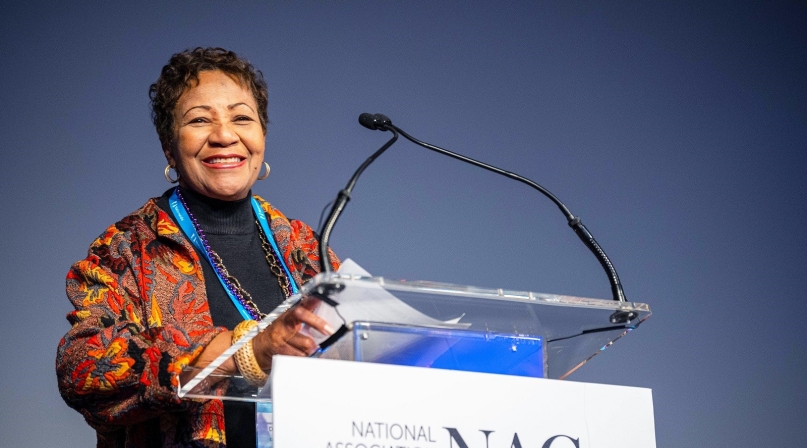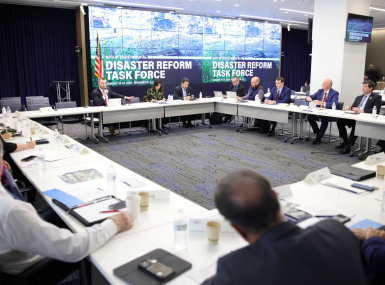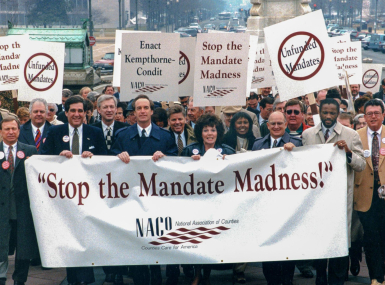Expanded perspective shapes Winfrey’s term as NACo president

Key Takeaways
NACo President Denise Winfrey’s term on the NACo executive committee began on a computer screen in July 2020, when she was elected second vice president during the virtual Annual Conference. She managed her transition as second vice president that year while also serving Will County, Ill. as county executive and then a member of the county Board.
Her year as NACo president followed a theme of Resiliency, Inclusion, Solvency and Empowerment — RISE — and an emphasis on county programs that will give residents across the board an opportunity to improve their lives. NACo has channeled that energy into problem-solving work by the Commission on Mental Health and Wellbeing and the Housing Task Force, and efforts to secure the future of county government operations through the Artificial Intelligence Exploratory Committee.
As she closes out her term and prepares to become immediate past president after the Annual Business Meeting July 24 in Travis County, Texas, Winfrey recently reflected on her year — a year she hopes inspires more women to seek leadership roles — in a conversation with County News.
Q: What were your favorite of the many trips you’ve taken representing NACo across the country?
A: The year has been absolutely wonderful, and the thing I’ve enjoyed the most is the wealth of friendship and just commonality among our membership in every state. Each association that I’ve visited has been more than welcoming. There’s nothing like visiting Hawaii, and the congressional delegation trip throughout Utah was incredibly enlightening, but I’ll always remember the reception in Alabama. I flew in late and arrived at the hotel at 10:30 and the lobby was full of county officials waiting to greet me. That’s a level of hospitality I never expected.
Q: You also got to welcome NACo Board members and Large Urban County Caucus members to Will County last December. What did you enjoy showing off?
A: I had a chance to show the Lion Electric plant and the BNSF rail yard, which are big parts of our multimodal transportation and logistics identity in Will County.
But what was most important was showing people what it’s like just to be here. We’re near Chicago, but we’re not the big city, and you can drive out to see generational farms that have been in families for hundreds of years.
We’ve got urban, suburban and rural, all three in the area. We have cities of 500 people, cities of 200,000 people and everything in between. We have the same issues as most other counties, whether it’s a shortage of workforce housing, mental health issues, addiction.
Q: How has county government changed since you first sought NACo office?
A: Will County updated our technology to make county offices more user-friendly and streamlined for our residents. That could mean going online to do business with the county or using drop boxes for voting and tax payments.
We’ve also increased security at public entrances to county buildings and given employees key cards to enter secured doorways. We still have sanitizer everywhere.
Counties nationwide have had more resources than ever thanks to the American Rescue Plan Act and the additional flexibility we have in spending relief money.
Will County has used ARPA money to underwrite support for health professionals through our college consortium, which will help people get their nursing degrees but also help them put down roots and turn them into long-term community members.
Q: What issues have you learned about thanks to your travels and connections with county officials nationwide?
A: When I was in Utah with Beaver County Commissioner Tammy Pearson, I asked her about what I thought was a dried drainage ditch, and she told me that was their river. That really showed me the extent of the drought in the West, and it was truly one of the values of being the president, because you don’t usually get to see it firsthand. You get to look up close at the issue they’re dealing with.
Q: To whom have you been able to communicate the county story as NACo’s ambassador?
A: NACo’s relationship with the White House has given me a chance to speak directly with presidential advisors Julie Chavez Rodriguez and Lukas McGowan, to talk about county infrastructure responsibilities with Mitch Landrieu (who manages the rollout of the Bipartisan Infrastructure Bill), and to be able to thank former House Speaker Nancy Pelosi for making the American Rescue Plan funding available to all counties.
The role as president also afforded me the chance to speak to the National Forum for Black Public Administrators and it felt good to be acknowledged given my 15 years in the county government and before that, township government.
Q: How have your experiences changed you at home as a Will County Board member?
A: Travel broadens people, and seeing how people from different areas manage things in their counties, you get a different perspective on what can and can’t be done.
Seeing a successful program in Oregon that housed people in a hotel motivated me to bring their materials to local officials and we’re adapting their plans to hopefully make it happen someday.
Q: What was your most exciting moment as president?
A: New Castle County, Del. Executive Matt Meyer asked me what President Biden would call me when I introduced him at the Legislative Conference.
Would he call me “Madam President?’ Sure enough, he did.
Then a few weeks later, I was at the White House for a Black History Month event, and I went out into the hallway to get some air, when the president left the event.
The cadet who was accompanying me noted that I shouldn’t reach out, but President Biden stopped when he got to me, reached out his hand and said, “Madam President!”
Q: What advice did you find helpful and what would you recommend to a NACo president?
A: People told me to take care of myself, and that was very important — do every event you can, every speaking engagement — but take care of yourself. NACo’s mental health initiative, we need it not just for our constituents, but our county officials.
The job has gotten more stressful, and you have to be accommodating with the public, but we need to make sure we take care of ourselves so we can do our job for them.
That means pacing yourself. I like to entertain whenever I am visiting people, but I make sure that someone I trust keeps track of time, so I can keep talking but someone else can hold me to it when it’s time to get some rest.
Attachments
Related News

National Association of Counties Announces Additions to Senior Leadership
The National Association of Counties (NACo) announced today that Abby Davidson has been promoted into the role of Chief Research Officer. Davidson joins Chief Government Affairs Officer Eryn Hurley, announced earlier this month, and 2025 additions Lori Dicker, Chief Public Affairs Officer, and Luis Guardia, Chief Financial Officer, to round out a series of additions to the association’s senior leadership team.

NACo history: Counties emerge from pandemic
Counties across the country emerged from the pandemic with a historic legislative achievement and a roadmap to making more out of the intergovernmental relationship.

